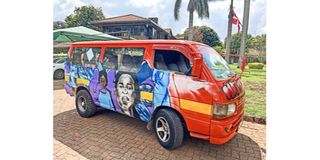Nairobi artists using graffiti to raise GBV awareness

One of the matatus branded by graffiti artist Ndereva Mutua
What you need to know:
- Mutua Ndereva, the artist who branded the vehicle, says he was inspired to speak out against ‘normalised violence’ that most women who use public transport undergo.
- Danish Ambassador Ole Thonke lauded the artists for creating GBV awareness and expressed concern about the rising cases of GBV in public service vehicles.
Nairobi graffiti artists have taken to branding matatus to raise passengers’ awareness of gender-based violence (GBV).
One of the recently remodelled vehicles named Mathree Mrembo (pretty vehicle) bears colourful call to action against abuse that women and girls experience when using public transport.
In tune with the theme colour of 16 Days of Activism against GBV, the matatu is painted in a vibrant orange with artistic depictions of various forms of violence. One of the most striking hashtags on the matatu is #MathreeToo, which loosely translates into ‘matatu too’.
Mutua Ndereva, the artist who branded the vehicle, said he was inspired to speak out against ‘normalised violence’ that most women who use public transport undergo.
“Most times, I see women being physically harassed by conductors to get into matatus and when they refuse, they are verbally abused. It has been difficult for me to stand up against the group of touts, so I decided to use graffiti to raise awareness of the issue,” Mr Mutua said.
Speaking during the launch of the Matatu in Mathare on Wednesday, Danish Ambassador Ole Thonke lauded the artists for creating GBV awareness. He also expressed concern about the rising cases of GBV in public service vehicles.
“Nairobi’s population is highly dependent on public transport; however, a United Nations study has shown that 80 per cent of women in Nairobi had been harassed while using matatus,” Mr Thonke stated.
Collective voice
According to Gender Violence Recovery Centre executive director Alberta Wambua, GBV cases in matatus are prevalent because most passengers don’t speak out against it. Addressing the audience at the launch, Ms Wambua urged matatu operators and passengers to use their collective voice to discourage perpetrators.
To assist survivors, Lilian Awuor, a human rights defender based in Mathare, wants the government to provide psychosocial support. “Some of the insults that conductors hurl at women when trying to persuade them to board a matatu are very demeaning. If you are not strong, you might even develop low-self-esteem or become depressed,” she said during the launch.
As part of the Danish Embassy’s 16 Days of Activism campaign, Mr Thonke committed to working with the recovery centre, local graffiti artists, Mathare youth community and local matatu owners to educate residents on women’s right to safety in public transportation.





